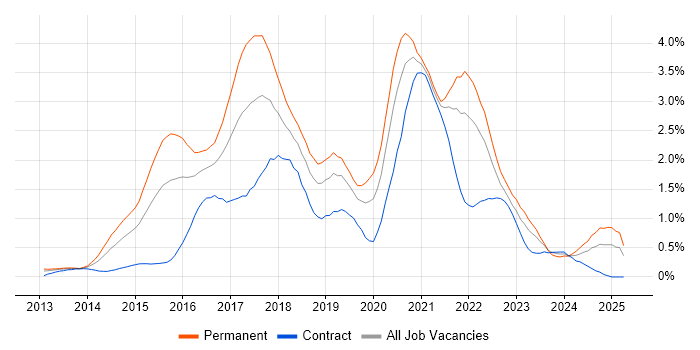NoSQL
South East > Buckinghamshire
The table below provides summary statistics and salary benchmarking for jobs advertised in Buckinghamshire requiring NoSQL skills. It covers permanent job vacancies from the 6 months leading up to 27 February 2026, with comparisons to the same periods in the previous two years.
| 6 months to 27 Feb 2026 |
Same period 2025 | Same period 2024 | |
|---|---|---|---|
| Rank | 83 | 81 | 114 |
| Rank change year-on-year | -2 | +33 | -19 |
| Permanent jobs citing NoSQL | 6 | 7 | 4 |
| As % of all permanent jobs in Buckinghamshire | 0.41% | 0.76% | 0.25% |
| As % of the Database & Business Intelligence category | 3.17% | 5.07% | 1.34% |
| Number of salaries quoted | 6 | 3 | 4 |
| 10th Percentile | £58,750 | - | £37,750 |
| 25th Percentile | £62,438 | £57,500 | £40,000 |
| Median annual salary (50th Percentile) | £67,250 | £60,000 | £51,250 |
| Median % change year-on-year | +12.08% | +17.07% | -21.15% |
| 75th Percentile | £68,750 | £63,125 | £65,313 |
| 90th Percentile | - | £63,500 | £65,875 |
| South East median annual salary | £60,000 | £62,500 | £75,000 |
| % change year-on-year | -4.00% | -16.67% | +25.00% |
All Database & Business Intelligence Skills
Buckinghamshire
NoSQL falls under the Databases and Business Intelligence category. For comparison with the information above, the following table provides summary statistics for all permanent job vacancies requiring database or business intelligence skills in Buckinghamshire.
| Permanent vacancies with a requirement for database or business intelligence skills | 189 | 138 | 299 |
| As % of all permanent jobs advertised in Buckinghamshire | 12.83% | 14.94% | 18.89% |
| Number of salaries quoted | 110 | 92 | 224 |
| 10th Percentile | £32,500 | £36,375 | £40,000 |
| 25th Percentile | £41,250 | £48,438 | £42,500 |
| Median annual salary (50th Percentile) | £52,500 | £60,000 | £55,000 |
| Median % change year-on-year | -12.50% | +9.09% | +3.77% |
| 75th Percentile | £63,750 | £75,250 | £60,000 |
| 90th Percentile | £71,375 | £76,000 | £83,375 |
| South East median annual salary | £57,500 | £59,125 | £55,000 |
| % change year-on-year | -2.75% | +7.50% | - |
NoSQL
Job Vacancy Trend in Buckinghamshire
Historical trend showing the proportion of permanent IT job postings citing NoSQL relative to all permanent IT jobs advertised in Buckinghamshire.

NoSQL
Salary Trend in Buckinghamshire
Salary distribution trend for jobs in Buckinghamshire citing NoSQL.

NoSQL
Job Locations in Buckinghamshire
The table below looks at the demand and provides a guide to the median salaries quoted in IT jobs citing NoSQL within the Buckinghamshire region over the 6 months to 27 February 2026. The 'Rank Change' column provides an indication of the change in demand within each location based on the same 6 month period last year.
| Location | Rank Change on Same Period Last Year |
Matching Permanent IT Job Ads |
Median Salary Past 6 Months |
Median Salary % Change on Same Period Last Year |
Live Jobs |
|---|---|---|---|---|---|
| Milton Keynes | -18 | 6 | £67,250 | +12.08% | 3 |
| NoSQL South East |
|||||
NoSQL
Co-Occurring Skills & Capabilities in Buckinghamshire by Category
The following tables expand on the one above by listing co-occurrences grouped by category. They cover the same employment type, locality and period, with up to 20 co-occurrences shown in each category:
